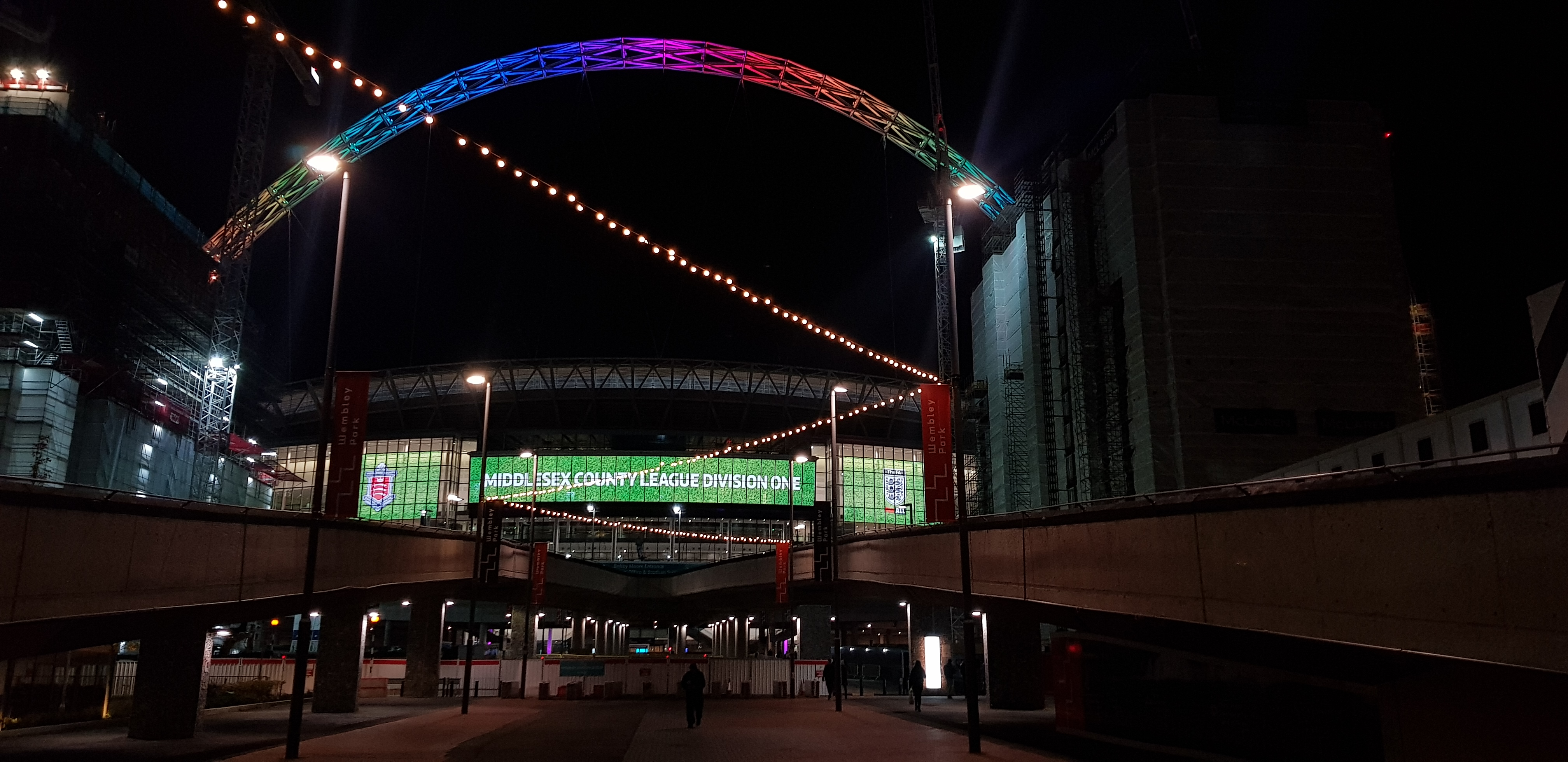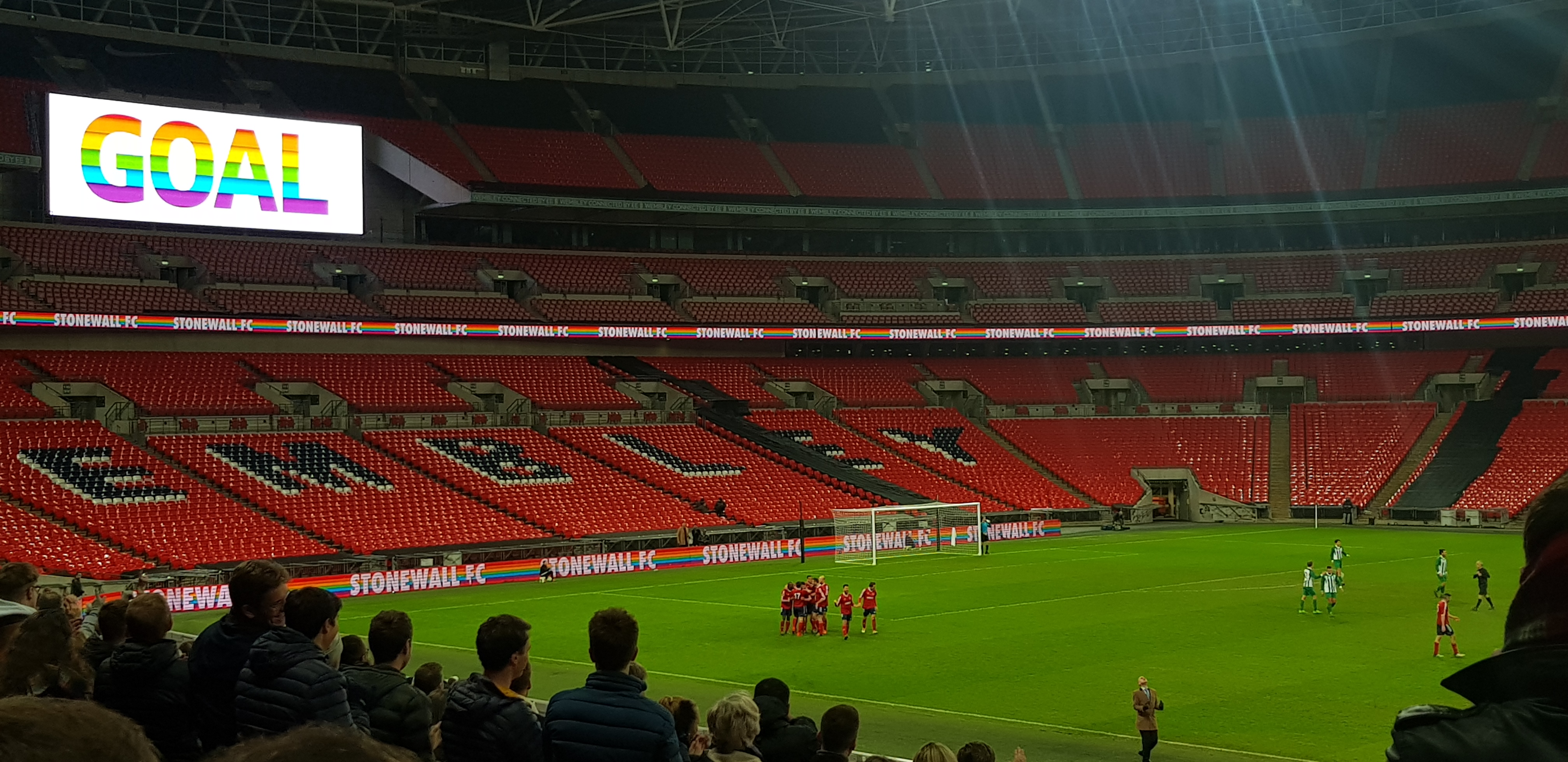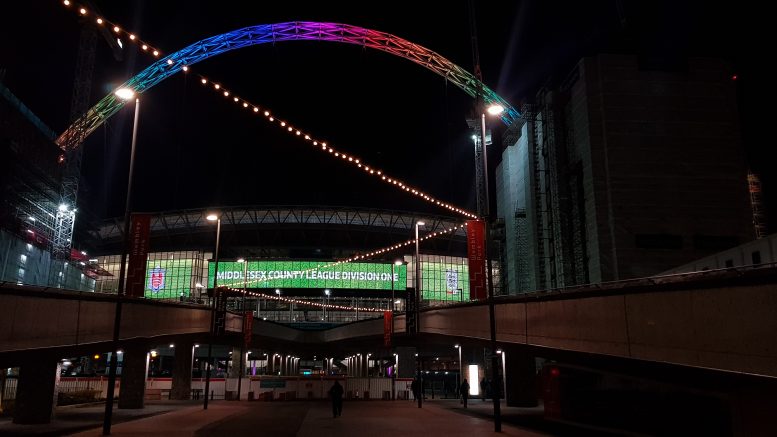
Wembley’s arch lit up to celebrate Stonewall’s Rainbow Laces campaign (Credit: Matthew Smith)
There are still no openly gay players in England’s professional leagues – so does that mean the Rainbow Laces campaign is failing?
Until Friday, Liam Davis of Cleethorpes United was the only gay man to have ever played at Wembley Stadium. It’s a stat that seems unlikely considering that football, American football and both codes of rugby have regularly been played at the stadium over the last 95 years.
That number suddenly jumped though once Stonewall FC, Britain’s most successful LGBT football club, walked out at the home of football to play against Wilberforce Wanderers. It was the FA’s grand gesture as part of Stonewall’s Rainbow Laces campaign that aims to increase inclusion across sport.
Now in its fourth year, the campaign aims for people from grassroots level to Premier League stars to show their support for the LGBT community by wearing special laces for a week and raising awareness against discrimination in sport.
Stonewall suggests it’s an opportunity for people to show they are an ‘active ally’ to make everyone feel included in sport, and that needs a holistic approach from sport – whether that’s from people in the community, fans on the sideline, or sponsors. It’s why games over the past weekend in rugby union’s Gallagher Premiership and the Premier League have seen scoreboards, corner flags and logos adorned with rainbows.
This is everyone’s game
We are supporting the #RainbowLaces campaign this weekend 🏳️🌈 pic.twitter.com/XqOwQeSsns
— Premier League (@premierleague) December 1, 2018
https://platform.twitter.com/widgets.js
But there’s only so much charities can do. And, as in the past, the sticking point has often been the players themselves. Before this year’s campaign started Olivier Giroud told the French Le Fiagro, “it was impossible” to be gay in football, followed by the slightly strange innuendo of “in a changing room, there is a lot of testosterone, rooming together, collective showers … It’s tricky but it’s like that.”
Giroud has appeared in the campaign before and supports the charity, but it’s reflective of the attitude of many players – he wasn’t exaggerating when he said; “There is still a lot of work in the football world on this subject.”
But that focus on the top might just be too simplistic. It’s almost a given at this point that no top-flight player will come out, even if many are supportive and are likely to show support over the weekend. Instead, Stonewall are looking towards the grassroots and the players and officials who go out every Sunday to play across the country.
Their latest campaign has ditched endorsements from Premier League stars, and instead included gay and lesbian fan groups and players at a community level (as well as former England women’s captain Casey Stoney, one of Britain’s most decorated LGBT sportspeople).
That’s also why Stonewall FC were invited to play at Wembley – in an effort to show that even the highest levels of the game are open to anyone.
We are minutes away from kick off in tonight’s historic match between @StonewallFC and @afcwilberforce being played @wembleystadium #RainbowLaces pic.twitter.com/XxIZoubeq6
— StonewallFC (@StonewallFC) November 30, 2018
Before the game, in a Bobby Moore suite decked out with rainbows and Stonewall’s branding, one of Stonewall FC’s founders Aslie Pitter spoke about why football played such an important part in his life – from a goalkeeper standing up in his defence in a particularly hostile changing room, to founding Stonewall FC 27 years ago, to success at the Gay Games, and eventually watching them play at Wembley.
As a black and gay footballer, there were times he questioned whether there was a place in the sport for him, but praised the process that had happened across the game to stop discrimination.
He mentions that Stonewall FC usually play in the same place as other teams, including women’s and children’s sides and “a few years ago there would only be a couple of people and coaches watching, but now there’s crowds and we feel actively feel involved. That’s something I never thought would happen.”
What Pitter has done is provide a space for people that they didn’t know they needed. In a handout before the game the sentiment kept being echoed when Chairman Alex Baker wrote; “at a pivotal point in my life, the club helped give me the confidence to be myself and make some amazing friends in the process.” While defender Mode Kenzi repeated that Stonewall FC provided him with “the confidence to play football again.”
When reading about Stonewall FC and other LGBT clubs in different sports, time and again there are stories of men who felt uncomfortable at other clubs or had to hide parts of their personal lives. Inclusive sides provide a way back into the game for those previously felt alienated, with one less thing to worry about. One day these sides may not be needed (Stonewall FC’s first two teams already play in the regular Middlesex structure) but for now they are an important step for gay men getting back onto the field.
Even away from inclusive sides, Stonewall see the Rainbow Laces campaign as an important tool for players who may feel uncomfortable in predominantly straight sides. If anyone was unsure how their sexuality would go down, then knowing that a teammate would be supportive – either by wearing the laces, or just through the conversations the weekend prompts – could be an important moment.
Despite the work that has been done, Pitter is cautious about the future; “I use the athlete’s foot analogy, you have to treat it and never for a minute think its gone away. You have to keep that discrimination where it belongs.”

Stonewall FC celebrate after Mike Sholly puts them 2-1 up against Wilberforce Wanderers (Credit: Matthew Smith)
That’s a statement that was echoed by Stonewall’s Director of Sport, Kirsty Clarke who said; “it’s really important to not be complacent about where we are. This is a fantastic event, but we need to engage with county FAs as well to make sure this is everyone’s game”.
So even if the Premier League and top divisions will back the campaign this weekend, it’s misguided to think the success of Stonewall’s work is dependent on a high profile player coming out.
In reality the success probably depends on these clubs, and what happens on the playing fields on Sunday mornings – rather than in the Premier League.
On Friday night, success might have been when Pitter admitted he “might start crying again” when he thought about the teams walking out; or success might have been when a man urged his son to proudly stand up and chant with other Stonewall fans, rather than just quietly clap along; or it might be just be as simple as Stonewall coming from behind to win 3-1 in front of over 1,000 people.
After Mike Sholly picked up Man of the Match, he told the FA he hoped; “spectacles like this give [younger kids] hope that they can come out, be yourself and play at a good level.” And if that happens, that really would be success.
Find your nearest LGBT inclusive club below
[googlemaps https://www.google.com/maps/d/u/0/embed?mid=1kggLHOXAivQCwNTGDMMf6GewZTfvo2zq&w=640&h=480]
Words: Matthew Smith Subbing: Charlie Bradley

